
“Giving birth – the most dangerous thing an African woman can do?” was the headline of an article in the UK Guardian newspaper 3 years ago.
The good news is that between 1990 and 2013, maternal mortality worldwide dropped by almost 50%.
The bad news is that few countries in Sub-Saharan Africa are a part of that statistic and so to a large extent the answer to the newspaper’s question is “Yes”.
Skilled care before, during and after childbirth can save the lives of women and new-born babies, yet only 46% of pregnant women in Sub-Saharan Africa have at least four antenatal care visits as recommended by the WHO. The result is that about 162,000 women die from pregnancy related issues in Africa every year – the equivalent of 900 medium-sized airplane crashes per year!
Data (United Nations Population Fund (UNFPA) Demographic Health Survey 2013) show that maternal deaths in Sub-Saharan Africa are due to these conditions:
- Severe bleeding (mostly bleeding after childbirth)
- Pre-existing conditions – diabetes, malaria, HIV, obesity
- High blood pressure during pregnancy (pre-eclampsia and eclampsia)
- Infections (usually after childbirth)
- Obstructed labour
- Unsafe abortion.
WHAT IS THE REALITY IN AFRICA?
In many African countries, the majority of women still give birth at home – about 18 million women yearly in Sub-Saharan Africa. In Nigeria only 38% of the annual 6.6 million births, are assisted by a skilled attendant of any kind. This means that millions of births, in Africa, are not assisted by a midwife, a doctor or a trained nurse.
Poorer women, particularly those living in rural areas with poor access to health services are far more likely to die in childbirth than those who are wealthier or who live in urban areas.
In sub-Saharan Africa, an estimated 900,000 babies die as stillbirths during the last twelve weeks of pregnancy – usually due to infections and other pregnancy complications.
The health of a new-born is directly linked to the care the mother receives before and during pregnancy, childbirth and after childbirth. The period with the highest risk for both mother and new born is during labour and the first few hours after birth. Women in Nigeria and other parts of Sub-Saharan Africa often do not get the healthcare and support they need not just during pregnancy, but during childbirth and in the hours and days immediately after childbirth. This adversely affects the survival of the mother and her new-born.
The warning signs of complications in pregnancy must not be over looked and include:
- Excessive vomiting
- Weight loss OR excessive weight gain
- Vaginal bleeding or discharge of any kind
- Abdominal pain
- Swelling of ankles and feet
- Fever
About 7-10 million women and girls suffer severe or long lasting disabilities caused by complications in pregnancy and childbirth – like obstetric fistulas and injuries to pelvic muscles, organs or the spinal cord. It is imperative that any of these signs that occur during pregnancy should be treated as urgent and brought to immediate medical attention.


